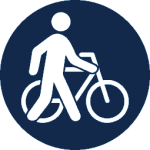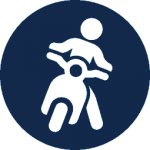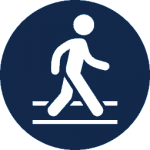Personal Safety
Personal safety is centered upon the importance of practicing situational awareness. By taking a few simple precautions, you can effectively reduce risk to yourself and discourage those around you to commit crimes.
General Tips
There is no magic formula to keeping yourself safe in a campus environment. Probably the closest thing to a magic formula is good old fashioned common sense. Does it make sense to be walking alone late at night? Is Carolina somehow immune to the crime trends of the surrounding area? Is it safe to leave a book bag unattended on a library table or outside the Student Stores? No, no and no. Below are some tips designed to reduce your risk of becoming victim of a crime:
The element of surprise is one of the most effective tools the criminal has. Take away that tool. While walking, take a frequent look behind and to the sides. Be aware of who is there. Often people are absorbed in thought, reading, listening to personal stereos, and any number of activities so distracting that a mugger or attacker can virtually be on top of them before they sense their presence. By then it’s too late to mount an effective escape.
Walking near dark shadowed or heavily foliaged areas can also increase your chances of being surprised by an attacker. Especially while walking alone, give these “hiding places” a wide berth. Even if you must cross a street or take other slightly inconvenient steps to distance yourself from potential hazards, a little inconvenience is far better than a lot of hurt. Again, be aware of your surroundings and don’t let these danger areas surprise you.
Campus lighting corridors provide increased lighting for walks and parking lots that are frequently used at night. Lighting corridors run from East Franklin Street at the north end of campus to Ram Village residence halls on south campus. East-west corridors follow Cameron Avenue and South Road.
No one intends to lose a wallet or purse, but it happens. Some people feel it’s a status symbol to see how many credit cards and how much cash they can cram into a wallet or purse. While it may look impressive, once lost it opens up your life to a common thief. Carry only what you need for each day and leave the rest at home secured in a proper place.
Check your statements! (This is easier to do before shredding). Unauthorized purchases are not too common but they do occur. Every time you use your credit card, you are giving your credit card number to another person; usually a complete stranger. Incidents have occurred where an unscrupulous cashier has retained that credit card number and made purchases. You need not have the actual credit card stolen from you in order to become the victim of a credit card fraud. Report any unauthorized purchases or transactions to your credit card company immediately and contact the police.
Alcohol impairs our brain, including our ability to make good sound decisions for ourselves. Impaired individuals may take chances that a sober person would never consider. Alcohol and other drug use can have academic consequences, such as missing class or poor performance, social consequences, and legal consequences.
UNC Police encourages you to follow state and federal laws as well as the Campus Alcohol Policy. There may be other policies at UNC that also apply to you, such as the Community Living Standards.
Remember:
- The drinking age is 21 in North Carolina
- Fake IDs are illegal
- Driving under the influence is illegal
- Being under the influence is not an excuse for committing a crime
Tips for safer socializing:
- Let others know where you are and what you are doing.
- When you go to social gatherings, go with a group of friends. Arrive together, check in with each other throughout the evening, and leave together.
- There are many other ways to be social without drinking.
- If you are of the legal drinking age and you choose to drink, know your limits and stick to them. Find more risk reduction strategies.
- Mixing alcohol and other drugs, even your own prescriptions, can be dangerous. Be sure to follow guidance from your medical provider, and talk with them honestly about your drinking.
- Don’t drink and drive. Call a cab/Uber, a sober friend, or take the bus.
- If you plan to walk home and you’ve been drinking, travel in small groups of trusted friends where at least some folks are sober.
For more information, visit alcohol.unc.edu.
Don’t be afraid to listen to that little voice in your head or feeling in your gut when it’s telling you something just doesn’t seem right. If you sense something is wrong, get away from the situation as soon as it is safe and accessible for you to do so.
Watch for behavior or attitudes that may signal trouble among friends, dates, and strangers.
- Does that person show a lack of respect?
- Do they want to make all the decisions?
- Are they pressuring you to drink alcohol or take drugs?
Any or all of these signals should send up a red flag. Since each situation is different, you may want to call 911 in an emergency, access a campus or community resource for assistance in safety planning, or consider other options for safely getting away from the other person or people involved.
Know where you need to go and the safest way to get there. Avoid shortcuts that take you into secluded or dark areas. Wear clothing and shoes that are comfortable and allow you to move quickly if necessary; and don’t become overloaded with packages. They can make you look defenseless.
When biking or jogging, find a friend to go with you. It makes exercise time more enjoyable and keeps you safer at the same time. Avoid wearing headphones which can make you less aware of your surroundings and once again avoid isolated areas. Also consider varying your routine. Stalkers can be very patient waiting for the right time to strike. Changing the time, routes, etc., can throw a stalker off guard.
No matter what kind of home you have, most of these tips apply to you. Before you reach the door make sure you have the door key in your hand. Fumbling for a key when someone is approaching makes you vulnerable to attack. Note the condition of your home as you approach and before entering. Are lights on that weren’t when you left? Is the door ajar? Is there damage to a door or window? If you think someone who doesn’t belong there might be in your home, DO NOT ENTER. Leave and call the police.
Outside doors of residence halls are locked to keep out people who shouldn’t be there. Don’t defeat this safety measure by holding the door open for the person behind you.
In high-rise apartments and residence halls, elevators are a way of life. Try not to enter an elevator alone or when a single rider that makes you uncomfortable is aboard. When you are on an elevator, try to stand near the control panel and note the location of the emergency alarm button. If attacked hit that alarm button NOT the STOP button.
If you live on campus and notice lights burned out in and around residence facilities or any other safety hazard, you can report them directly to Facilities Services at 919-962-3456 or UNC Police at 919-962-8100.
UNC Point-to-Point (P2P) provides fare-free on-demand and fixed route transit services around campus after Chapel Hill Transit stops running. The P2P Express and P2P Shuttle can be tracked using the TransLoc Rider app or the TransLoc website.
Rape and sex offenses are serious crimes under North Carolina law. These offenses, also prohibited under UNC-Chapel Hill’s Policy on Prohibited Harassment, Discrimination, and Related Misconduct as acts of Sexual Assault or Sexual Violence, may be perpetrated by someone you are dating or in a relationship with, a friend or acquaintance, a family member, someone you just met, or someone you don’t knows.
Here are some of the things we know about sexual assault:
- Most sexual assaults are committed by non-strangers in familiar social situations and places.
- Many incidents of sexual assault involve alcohol consumption by at least one of the involved parties, according to the AAU Sexual Assault and Sexual Misconduct Campus Climate Survey data. Watch out for your friends when they are drinking, and ask them to watch out for you, too. Communities are safest when members look out for each other.
- Perpetrators often target intoxicated individuals and/or use alcohol to facilitate assault, such as by encouraging someone to drink more or giving someone alcohol or other drugs without their knowledge. Don’t leave your drink (alcoholic or otherwise) unattended. Only accept drinks which were poured in front of you and have not been left unattended at any time.
Safety tips to consider:
- Trust your instincts. If you are uncomfortable in a situation, then trust your gut reaction and get out of that situation as soon as possible.
- When you go to social gatherings, go with a group of friends. Arrive together, check in with each other throughout the evening, and leave together.
- Encourage group activities in the early stages of any relationship. Don’t leave an event with someone you just met or don’t know well.
- Limit how much personal information you provide to a stranger or new acquaintance. When someone asks for your number, ask for theirs instead.
- On a first or second date, suggest meeting at a public place rather than having someone pick you up. If you have your own car with you or know the nearest public transportation, you can easily leave if your date turns aggressive or drinks too much.
- Know that you have the right to set limits on sexual activity or to say no to sexual activity, whether or not you have previously had sexual contact with someone. If you overhear someone talk about taking advantage of a partner sexually, let the person know you think this is wrong.
Always remember, sexual violence is never the victim’s fault. Perpetrators are responsible for these crimes.
For more information on resources and options at Carolina, visit safe.unc.edu.





